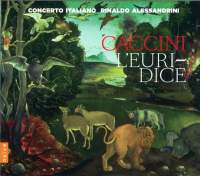Texte paru dans: / Appeared in:

Fanfare Magazine: 37:6 (07-08/2014)
Pour
s'abonner / Subscription information
Les abonnés à Fanfare Magazine ont accès aux archives du
magazine sur internet.
Subscribers to Fanfare Magazine have access to the archives of the magazine
on the net.
Naïve
OP30552

Code-barres / Barcode : 0709861305520
(ID383)
Back in 2010 I reviewed a previous recording of L’Euridice (Ricercar 269; Fanfare 33:3) under Nicolas Achten’s direction and was largely positive about the voices, but expressed displeasure with poor enunciation, distant miking, and smoothed-out phrasing which underplayed the work’s emotion-driven, declamatory rhythms. I find upon listening once more to the disc that my impressions haven’t changed. This new version under Rinaldo Alessandrini does improve on it in all three respects. It is recorded better, the words are much clearer, and the emotions are tangible—both in the way the music proceeds forward by emotive arcs, and by the expressive faces each performer brings to their work.
That noted, there is a difference between accenting consonants, lengthening vowels, changing volume and dynamics, controlling resonance, vibrato, and phrasing effects on the one hand, and poor intonation, slurring up to notes, and speaking exclamations (“Ohimè!”) on the other. The latter is the provenance of some verismo performances; and whether it even belongs there is doubtful. With the exception of Sara Mingardo and Furio Zanasi, all the cast on this new L’Euridice are guilty of one or more of these failings. The worst is probably Silvia Frigato, at least where intonation is concerned. As she has two of the largest roles, Euridice and Tragedy, the piece suffers accordingly. With a hard, unyielding tone, she’s a long way here from my review two years ago in Cavalli’s Artemisia (Glossa 920918), when I praised her “light, silvery soprano” for the “way it easily moves with equal lack of pressure from note to note, regardless of tempo.” Even Zanasi, one of my favorite modern baritones, occasionally moves here to the flat side of a note, but most of the cast does much worse. (The worst singing here comes from Antonio Abete. Sadly, this fine artist, whose voice I noted was fraying back in a 2007 review of Handel’s Fernando, now wobbles constantly in the general area of any given pitch.) Given the prevalence of this and the other issues raised above, I have to think Alessandrini was deliberately trying for a careless, rough-and-ready approach, one that may derive from its presentation on stage last year. But if that’s the case, it doesn’t explain why Mingardo, who assumes the roles of both Dafne and Proserpina, sounds her usual magnificent self, with a burgundy mezzo, endless supplies of breath, and aristocratic phrasing that never leaves the written note.
Though Alessandrini deploys eight instrumentalists and Achten five, in practice only two or three are heard from in continuo on both recordings at any given time. Their selections of instruments are roughly identical, though when they differ in specifics Alessandrini typically goes for the more forceful, Achten for the more intimate. Thus Orfeo’s “Non piango, e non sospiro” is accompanied under the former by the organ, the latter by the theorbo.
So, who to prefer? Alessandrini gets the emotive guts of the piece right, but there’s simply too much singing here that’s painful to listen to. Achten’s version, whose attempt at an elevated tone sounds somewhat bloodless and always subdued, is still the recording to get. Hopefully another recording will come along that combines the best of both.
Cliquez l'un ou l'autre
bouton pour découvrir bien d'autres critiques de CD
Click either button for many other reviews


